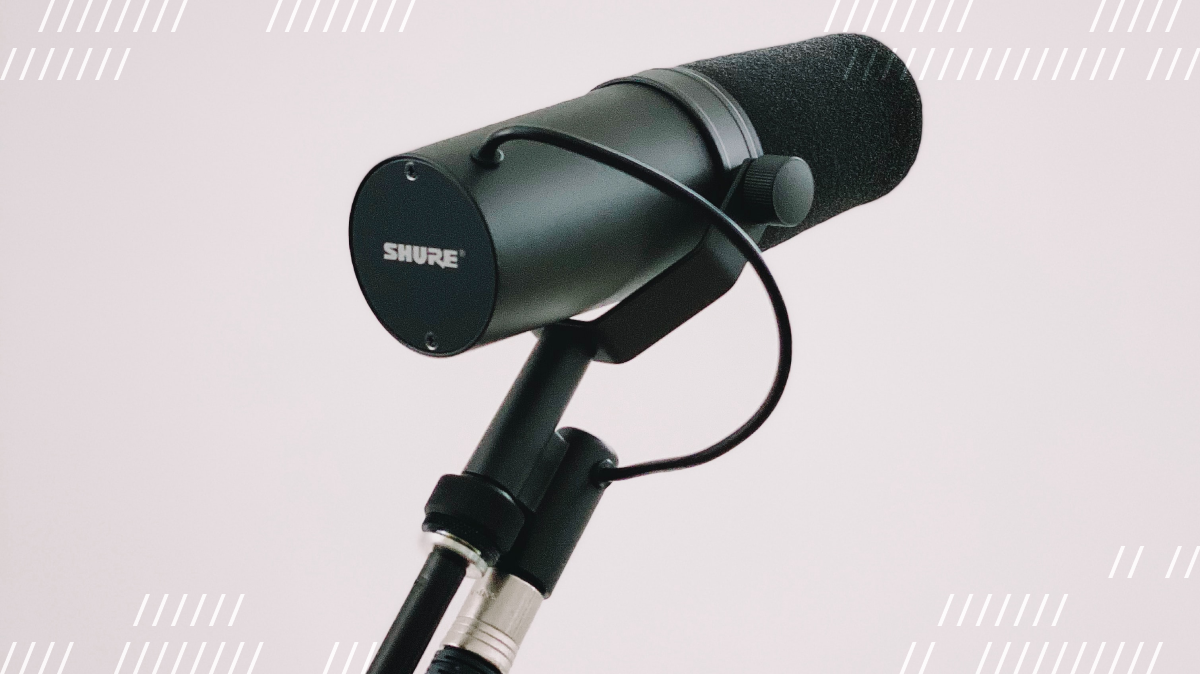[14/01/22] This demo app uses manifest v2. Manifest v2 is being deprecated by Chrome in 2022 and will no longer be accepted into the Chrome store.
This tutorial is part of a series on how we built Daily Collab, our latest Chrome extension demo, which lets you embed and transcribe Daily video calls in any Notion page.
Daily built the recent Chrome extension demo, Daily Collab, to show how Daily and Notion’s APIs could work together to embed a custom video chat experience in Notion. Our project goal was to embed a video widget into any Notion document, as well as to let users optionally transcribe their calls right to Notion.
Building out the video and transcription features into the Daily Collab Chrome extension requires integrating the Notion API in two main ways:
- Authorizing Notion document edits via a public integration. We covered this in a previous post on working with Notion.
- Making
PATCHrequests via the Notion API to append block children to a specific Notion document as transcription text is received.
In today’s tutorial, we’ll cover this second step, and see how appending transcription text was accomplished in the Daily Collab demo.
If you’re interested in learning more about Daily Collab’s features or how Chrome extensions work, check out our previous posts from our Daily Collab series.
Tutorial goals
Our main goals today will be to understand:
- How to use Notion’s
PATCHrequest to append new block children to a Notion document - Where this
PATCHrequest is incorporated into the Daily Collab structure - How to prefix transcription text with the speaker’s name
Getting started
To follow along in the full source code for Daily Collab, check out the Github repo.
If you want to test out Daily Collab locally, you will need to:
- Clone Daily Collab locally
- Run
npm installto install the dependencies - Run
npm run start - Load your extension on Chrome following:
- Access
chrome://extensions/ - Check
Developer mode - Click on
Load unpacked extension - Select the
buildfolder.
- Access
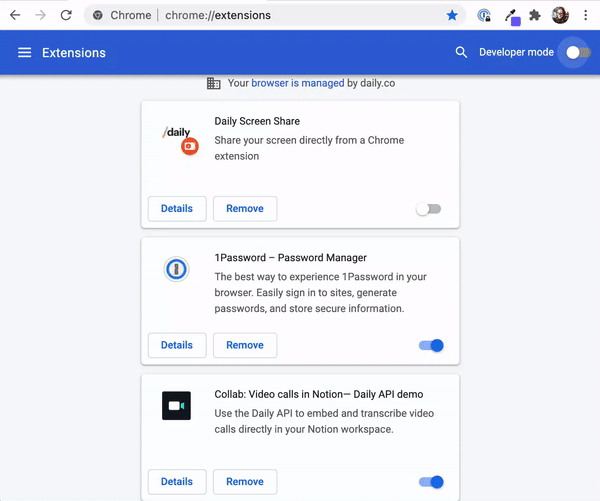
How Daily transcription text is generated and sent to the client
Before we discuss how Daily Collab handles transcription text received client-side, let’s discuss how the text is even generated.
Daily uses Deepgram to get transcription text for live Daily calls that have transcription enabled. If transcription has been turned on for a call, daily-js will send an app-message participant event each time Deepgram reports new transcription text. This “app message” is a broadcast message, which means it is sent to every participant in the call.
To receive the text client-side, you will need to add an event listener to your local instance of the Daily callframe. Let’s take a look now at how to create an event listener.
Note: Daily Collab is using an internal, not-so-secret Daily transcription method that should not be used in production apps. Keep an eye out for the public feature announcement coming soon. 👀
Receiving transcription text through an app-message Daily event
Receiving the transcription text client-side will look the same regardless of what you’re planning on doing with the text. You can attach an event listener for the Daily app-message event and pass a callback for how you’d like to handle the text, like so:
import DailyIframe from '@daily-co/daily-js';
…
const handleAppMessage = (e) => {
console.log('[APP MESSAGE]', e);
// check if the message is a transcription message (vs. a chat message)
if (e?.fromId === 'transcription' && e?.data?.is_final) {
// handle transcription text: e.data.text
}
};
const callFrame = DailyIframe.createCallObject({ url: DAILY_ROOM_URL });
callFrame.on('app-message', handleAppMessage);Notice how we’re checking the fromId in the app-message event? This is because app-messages can be triggered from multiple sources, whether it be a chat message, transcription, or really any type of text-based data you’d like to pass between participants.
To ensure you’re checking for transcription text specifically, the fromId should be transcription and the data object attached will have an is_final key with the value true.
How Daily and Notion APIs collaborate
The Daily Collab Chrome extension has several moving pieces that work together to get full feature functionality. To start, Daily Collab’s content script is where all the UI (React app) lives and where the Daily callFrame instance is initialized. The app-message event listener is added in the CallProvider context, which is where most of the app’s state is managed.
*Note: Learn more about how information is sent is our previous tutorial on the custom Daily Collab API.
In terms of how app messages are handled, Daily Collab’s app-message event handler looks similar to the example included above:
const handleAppMessage = (e) => {
console.log('[APP MESSAGE]', a);
// Check if the message is transcription text
if (e?.fromId === 'transcription' && e?.data?.is_final) {
const p = daily.participants();
const local = p.local;
...
// Each participant handles added their own text to avoid duplication
if (local.session_id === e.data.session_id) {
/**
* Send message to background script to add the transcription text to Notion doc
*/
addTextToNotionFromBackground(e.data.text, workspaceId, local.user_name);
}
...
}
};
Any time a message is received that is transcription text, we send that text to the background script.
To do this, we need to pass the text, the Notion workspace ID, and the speaker’s username, like so:
const addTextToNotionFromBackground = (newText, workspaceId, username) => {
chrome.runtime.sendMessage({
newText,
workspaceId,
username,
}, () => {});
};
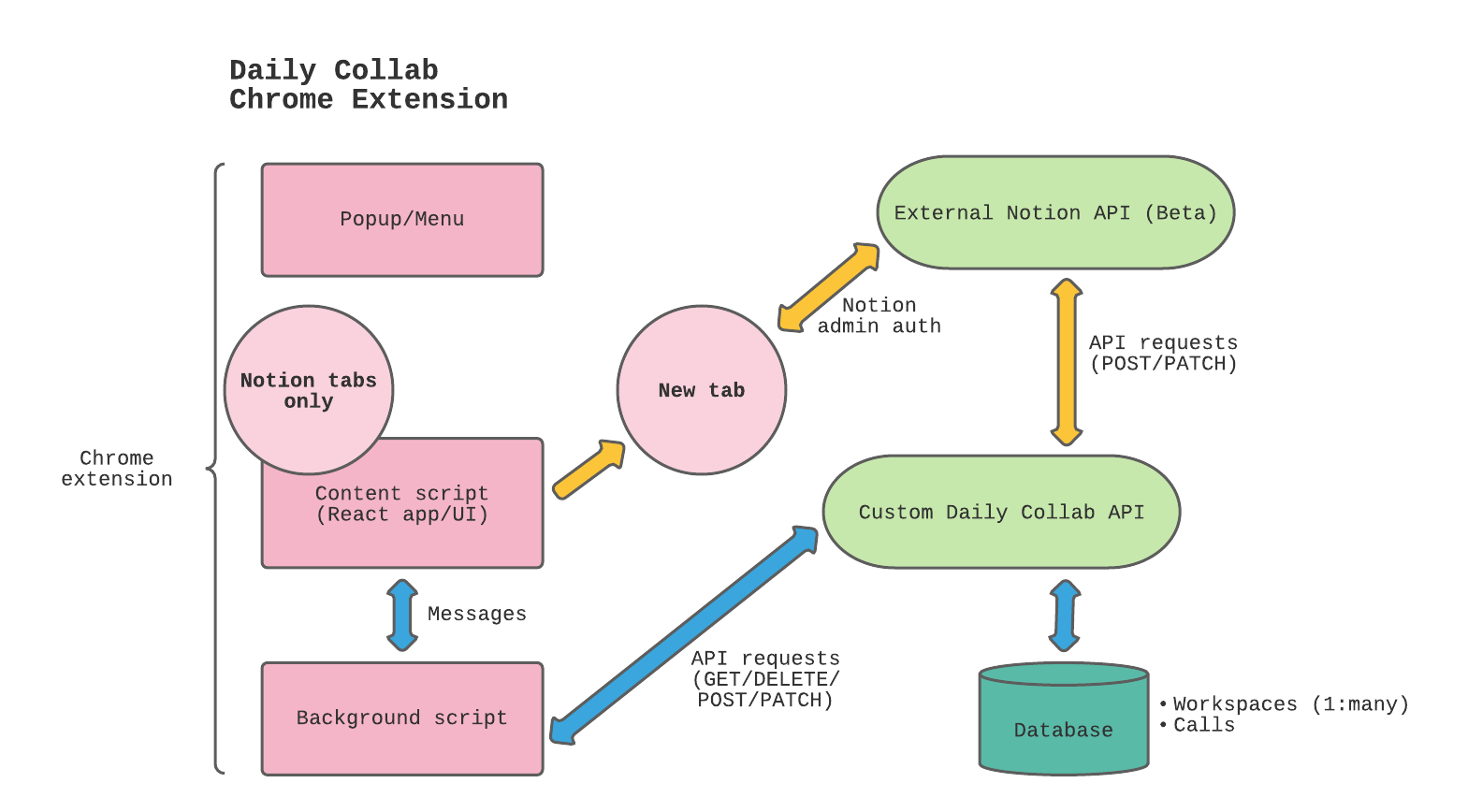
Once the text is passed from the content script to the background script, it needs to be explicitly received. That looks like this:
async function handleMessageReceived(request, sender, sendResponse) {
const {
newText,
} = request;
…
if (newText) {
await addTranscriptionTextToNotionDoc(request, sender.tab);
}
...
sendResponse('message received');
}
/**
* Listen for messages and determine which message is sent in parent handler
*/
chrome.runtime.onMessage.addListener(handleMessageReceived);All messages received by the background script are received by the same listener that then determines what to do next based on the message. If the message has a newText key, we know it’s new transcription text to append to the current Notion doc.
To actually make the request we then send the text to the Daily Collab API, which handles all API requests.
async function appendText(id, text, workspaceId, username) {
const shortId = id.slice(id.length - 32);
const block = await fetch(`${DAILY_COLLAB_API_BASE_URL}/calls/${id}`, {
method: 'PATCH',
headers: {
'Content-Type': 'application/json',
},
body: JSON.stringify({
text,
isTranscribing: true,
shortId,
workspaceId,
username,
}),
});
const response = await handleTranscriptionResponse(block);
return response;
}
The Daily Collab custom API is what actually handles the request to Notion’s API.
The request to the Notion API (updateNotionPage) uses a PATCH request to append block children to a Notion document.
To make this request, you need:
- The Notion document ID, which is the last 32 characters of a Notion document URL. For example, in the following URL,
5ca9e2e91bd64762bfa969f843cc889cis the Notion document ID.
https://www.notion.so/example-domain/Proposal-5ca9e2e91bd64762bfa969f843cc889c
- To authenticate the request, which we do with Notion’s public integration, described in one of our previous posts. (That is how the
tokenis created in the code block below.)
async function updateNotionPage(docId, content, token, username) {
const block = {
object: "block",
type: "paragraph",
paragraph: {
text: [
{
type: "text",
text: {
content,
},
},
],
},
};
const doc = await fetch(
`${process.env.NOTION_REST_URL}/blocks/${docId}/children`,
{
method: "PATCH",
headers: {
Accept: "application/json",
"Content-Type": "application/json",
Authorization: `Bearer ${token}`,
"Notion-Version": "2021-05-13",
},
body: JSON.stringify({
children: [block],
}),
}
);
return await doc.json();
}
In updateNotionPage, we set our new block child to be a paragraph with the text content equal to the transcription text received in the client. That block is then passed in the PATCH request’s body to be received by Notion’s API.
In terms of how to format the text, you may prefer to include the call participant’s name that they set in the Daily Collab UI when joining the call. This helps the future transcription reader know who said what.
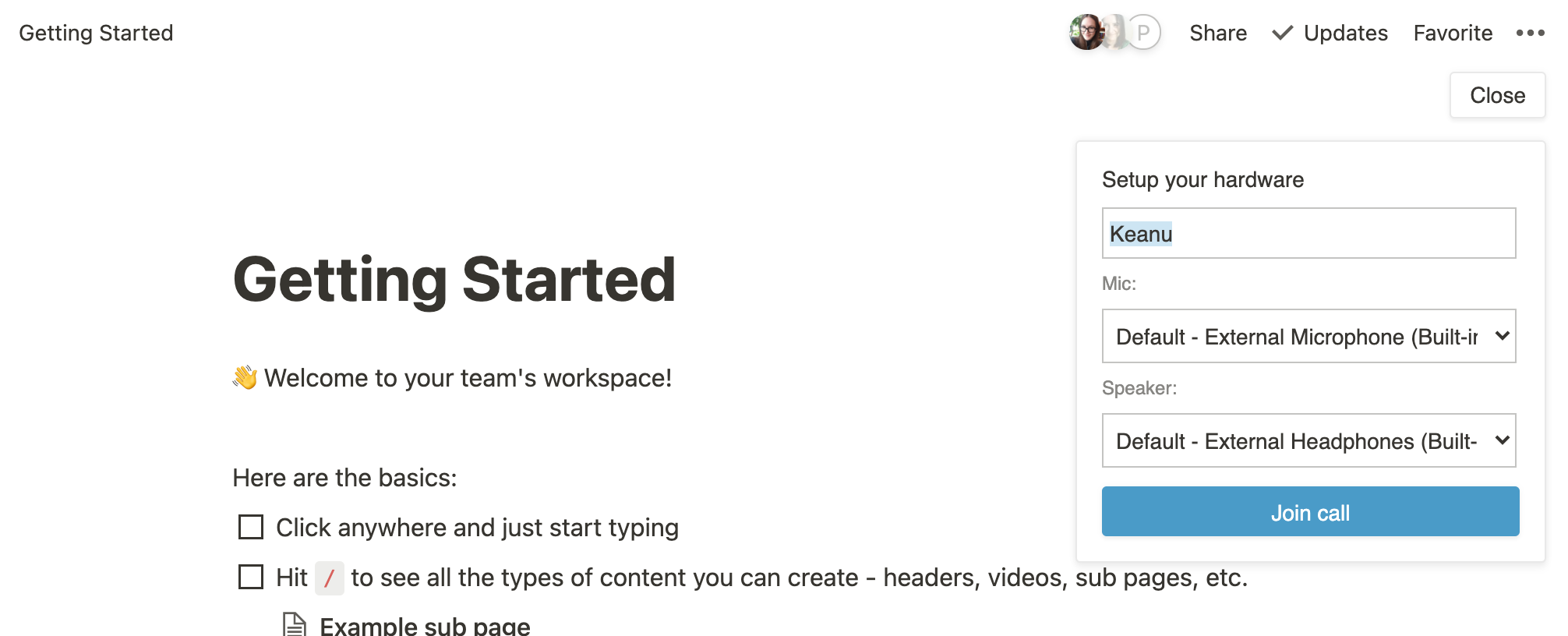
To do this, you can prepend the username to the text passed in the request’s body before submitting it, like so:
async function updateNotionPage(docId, content, token, username) {
const block = {
object: "block",
type: "paragraph",
paragraph: {
text: [
{
type: "text",
text: {
`${username}: ${content}`,
},
},
],
},
};
Once the text is sent, the PATCH request sent to the Notion API via the Daily Collab custom API will return a success or error response. If the request is successful, the text will have been added to the screen. If it wasn't, we'll return an error from the background script to the content script.
In the background script, we handle this like so:
async function addTranscriptionTextToNotionDoc(request, tab) {
const notionId = getNotionId(tab);
if (!notionId) return;
const block = await appendText(
notionId,
request?.newText,
request?.workspaceId,
request?.username
);
// set error if there was an auth error
if (block?.error) {
const error = block.error === UNAUTHORIZED_ERROR ? block.error : '';
const message = {
error,
};
// send error to content script
chrome.tabs.sendMessage(tab?.id, message, noop);
}
}Seeing our transcription results in Notion
Once the transcription text is added, we can see the text display in the Notion document. From a user's perspective, here is what successfully appending transcription text will look like:
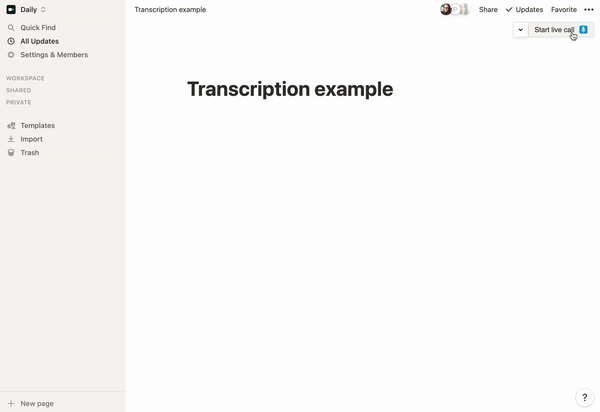
If the request throws an error, we do show an error message so the user knows there’s an issue, as mentioned above. Transcription errors are most often due to authorization issues since updating Notion documents with Notion's API must be authenticated.
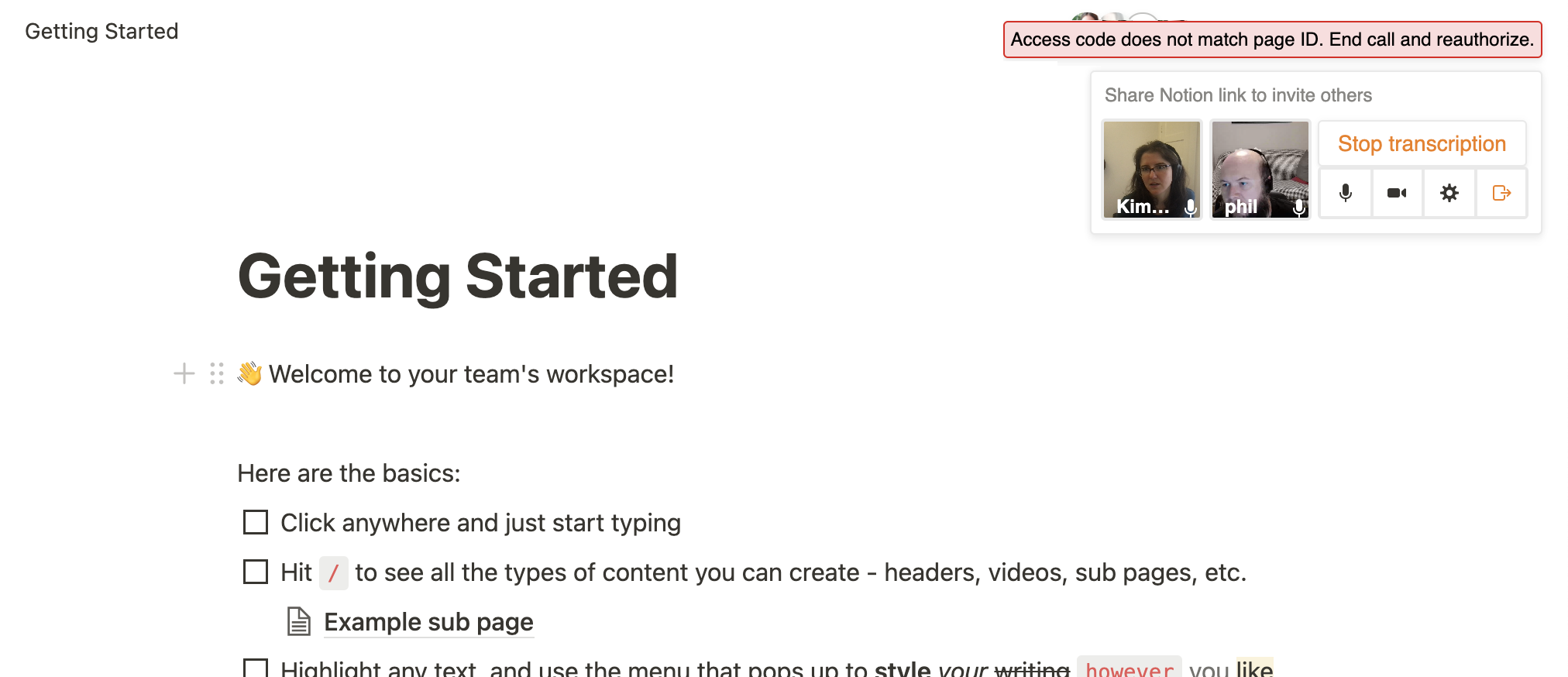
To solve this issue, try reauthorizing the Notion API in Daily Collab.
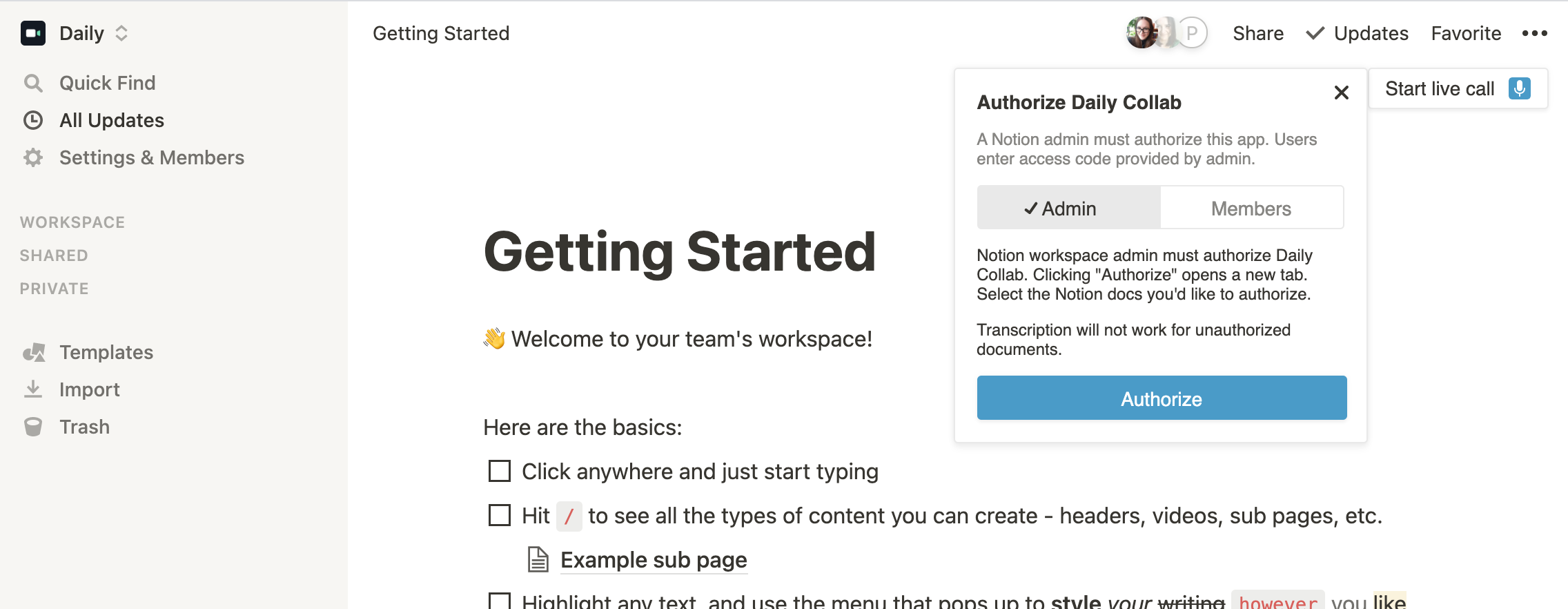
Transcription text is taking a road trip
You may be thinking, “Wow, that’s a long trip for a little bit of text to get added to the page!” and, honestly, you’re right!
There are a few reasons we use this structure for interacting with the Notion API versus just making the API request from the content script.
Firstly, we use the Daily Collab custom API endpoints to keep all API requests related to Daily Collab in one place. It also means all application secrets (ex. API keys) related to Daily Collab can be isolated in the API, instead of needing to expose them to the client-side code, too. This is standard practice at Daily to avoid exposing application secrets unnecessarily.
Additionally, with this structure, all API requests go through the background script to the Daily Collab API to keep the background script the central “brain” of the Chrome extension. This is how we decided to organize things in this use case, but ultimately it’s up to you!
Wrapping up
In the end, getting a Daily video call and the Notion API to work together was as simple as making a Notion API request based on a call participant event (app-message).
This feature could be expanded even further to do something fun like make a Notion API request based on a voice command. For example, saying, “Get all users”, could trigger a GET request to retrieve all Notion users if the transcription text matched that string.
Let us know what other feature ideas you have and how we can help you build your own Daily apps!

